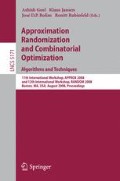Abstract
We consider (uniform) reductions from computing a function f to the task of distinguishing the output of some pseudorandom generator G from uniform. Impagliazzo and Wigderson [10] and Trevisan and Vadhan [24] exhibited such reductions for every function f in PSPACE. Moreover, their reductions are “black box,” showing how to use any distinguisher T, given as oracle, in order to compute f (regardless of the complexity of T). The reductions are also adaptive, but with the restriction that queries of the same length do not occur in different levels of adaptivity. Impagliazzo and Wigderson [10] also exhibited such reductions for every function f in EXP, but those reductions are not black-box, because they only work when the oracle T is computable by small circuits.
Our main results are that:
-
Nonadaptive black-box reductions as above can only exist for functions f in BPPNP (and thus are unlikely to exist for all of PSPACE).
-
Adaptive black-box reductions, with the same restriction on the adaptivity as above, can only exist for functions f in PSPACE (and thus are unlikely to exist for all of EXP).
Beyond shedding light on proof techniques in the area of hardness vs. randomness, our results (together with [10,24]) can be viewed in a more general context as identifying techniques that overcome limitations of black-box reductions, which may be useful elsewhere in complexity theory (and the foundations of cryptography).
Access this chapter
Tax calculation will be finalised at checkout
Purchases are for personal use only
Preview
Unable to display preview. Download preview PDF.
References
Babai, L., Fortnow, L., Lund, C.: Non-deterministic exponential time has two-prover interactive protocols. In: Proceedings of the 31st Annual IEEE Symposium on Foundations of Computer Science, pp. 16–25 (1990)
Babai, L., Fortnow, L., Nisan, N., Wigderson, A.: BPP has subexponential simulation unless EXPTIME has publishable proofs. Computational Complexity 3, 307–318 (1993)
Blum, M., Micali, S.: How to generate cryptographically strong sequences of pseudo-random bits. SIAM Journal on Computing 13(4), 850–864 (1984)
Bogdanov, A., Trevisan, L.: On worst-case to average-case reductions for NP problems. In: Proceedings of the 44th Annual IEEE Symposium on Foundations of Computer Science, pp. 308–317 (2003)
Gutfreund, D., Rothblum, G.: The complexity of local list decoding. Technical Report TR08-034, Electronic Colloquium on Computational Complexity (2008)
Gutfreund, D., Shaltiel, R., Ta-Shma, A.: If NP languages are hard in the worst-case then it is easy to find their hard instances. Computational Complexity 16(4), 412–441 (2007)
Gutfreund, D., Ta-Shma, A.: Worst-case to average-case reductions revisited. In: Charikar, M., Jansen, K., Reingold, O., Rolim, J. (eds.) RANDOM 2007. LNCS, vol. 4627, pp. 569–583. Springer, Heidelberg (2007)
Gutfreund, D., Vadhan, S.: Limitations of hardness vs. randomness under uniform reductions. Technical Report TR08-007, Electronic Colloquium on Computational Complexity (2008)
Impagliazzo, R., Kabanets, V., Wigderson, A.: In search of an easy witness: Exponential time vs. probabilistic polynomial time. Journal of Computer and System Sciences 65(4), 672–694 (2002)
Impagliazzo, R., Wigderson, A.: Randomness vs. time: de-randomization under a uniform assumption. Journal of Computer and System Sciences 63(4), 672–688 (2001)
Jerrum, M., Valiant, L., Vazirani, V.: Random generation of combinatorial structures from a uniform distribution. Theor. Comput. Sci. 43, 169–188 (1986)
Kabanets, V., Impagliazzo, R.: Derandomizing polynomial identity tests means proving circuit lower bounds. Computational Complexity 13(1-2), 1–46 (2004)
Karp, R.M., Lipton, R.J.: Some connections between nonuniform and uniform complexity classes. In: Proceedings of the 12th Annual ACM Symposium on Theory of Computing, pp. 302–309 (1980)
Klivans, A.R., van Melkebeek, D.: Graph nonisomorphism has subexponential size proofs unless the polynomial-time hierarchy collapses. SIAM Journal on Computing 31(5), 1501–1526 (2002)
Lipton, R.: New directions in testing. In: Proceedings of DIMACS workshop on distributed computing and cryptography, vol. 2, pp. 191–202 (1991)
Nisan, N., Wigderson, A.: Hardness vs. randomness. Journal of Computer and System Sciences 49, 149–167 (1994)
Reingold, O., Trevisan, L., Vadhan, S.: Notions of reducibility between cryptographic primitives. In: Naor, M. (ed.) TCC 2004. LNCS, vol. 2951, pp. 1–20. Springer, Heidelberg (2004)
Santhanam, R.: Circuit lower bounds for arthur–merlin classes. In: Proceedings of the 39th Annual ACM Symposium on Theory of Computing, pp. 275–283 (2007)
Sipser, M.: A complexity theoretic approach to randomness. In: Proceedings of the 15th Annual ACM Symposium on Theory of Computing, pp. 330–335 (1983)
Stockmeyer, L.: On approximation algorithms for \(\sharp\)P. SIAM Journal on Computing 14(4), 849–861 (1985)
Shaltiel, R., Umans, C.: Simple extractors for all min-entropies and a new pseudorandom generator. Journal of the ACM 52(2), 172–216 (2005)
Shaltiel, R., Viola, E.: Hardness amplification proofs require majority. In: Proceedings of the 40th Annual ACM Symposium on Theory of Computing, pp. 589–598 (2008)
Trevisan, L.: Construction of extractors using pseudo-random generators. Journal of the ACM 48(4), 860–879 (2001)
Trevisan, L., Vadhan, S.: Pseudorandomness and average-case complexity via uniform reductions. Computational Complexity 16(4), 331–364 (2007)
Umans, C.: Pseudo-random generators for all hardnesses. Journal of Computer and System Sciences 67(2), 419–440 (2003)
Yao, A.C.: Theory and applications of trapdoor functions. In: Proceedings of the 23rd Annual IEEE Symposium on Foundations of Computer Science, pp. 80–91 (1982)
Author information
Authors and Affiliations
Editor information
Rights and permissions
Copyright information
© 2008 Springer-Verlag Berlin Heidelberg
About this paper
Cite this paper
Gutfreund, D., Vadhan, S. (2008). Limitations of Hardness vs. Randomness under Uniform Reductions. In: Goel, A., Jansen, K., Rolim, J.D.P., Rubinfeld, R. (eds) Approximation, Randomization and Combinatorial Optimization. Algorithms and Techniques. APPROX RANDOM 2008 2008. Lecture Notes in Computer Science, vol 5171. Springer, Berlin, Heidelberg. https://doi.org/10.1007/978-3-540-85363-3_37
Download citation
DOI: https://doi.org/10.1007/978-3-540-85363-3_37
Publisher Name: Springer, Berlin, Heidelberg
Print ISBN: 978-3-540-85362-6
Online ISBN: 978-3-540-85363-3
eBook Packages: Computer ScienceComputer Science (R0)

